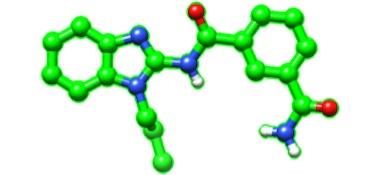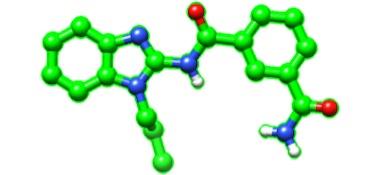
Credit: Duke Health
DURHAM, N.C. — A drug-like molecule developed by Duke Health researchers appears to intercede in an inflammatory response that is at the center of a variety of diseases, including some cancers, rheumatoid arthritis and Crohn's disease.
The molecule, called Takinib, works on a cell-signaling protein called tumor necrosis factor alpha, or TNF-alpha, which is a major contributor to tissue inflammation. In recent years, several biological drugs have been developed to interfere with TNF-alpha and treat both auto-immune disorders and some cancers, but patients often develop resistance or side effects.
The Duke team, lead by Timothy Haystead, Ph.D., a professor in the Department of Pharmacology and Cancer Biology, and Emily Derbyshire, Ph.D., assistant professor in the Department of Chemistry, conducted cell-based experiments to learn how the Takinib molecule influences a series of events to suppress cell death. Their work appears in the Aug. 17 issue of the journal Cell Chemical Biology.
The researchers found that Takinib inhibits an enzyme called TAK-1, which serves as a switch controlling cell survival in the TNF-alpha signaling process.
"The delicate balance between survival and death is often disrupted in disease, and this molecule is able to target the process," Haystead said. "This compound could potentially enhance the positive parts of TNF-alpha by only targeting tumor cells or inflammatory cells."
The compound also appears to be effective in small amounts, potentially reducing the toxicity that has been shown in biological compounds targeting the same inflammatory pathway.
Derbyshire said additional studies are underway to test Takinib in animals, focusing first on the molecule's effects in rheumatoid arthritis to determine whether it could have therapeutic benefit and then expanding to other diseases, including malaria.
"Takinib is unique for its ability to selectively target a pathway, since many inhibitors shut everything down," Derbyshire said. "It appears to have a more surgical ability to inhibit this pathway."
###
In addition to Derbyshire and Haystead, study authors include Juliane Totzke, Deepak Gurbani, Rene Raphemot, Philip F. Hughes, Khaldon Bodoor, David A. Carlson, David R. Loiselle, Asim K. Bera, Liesl S. Eibschutz, Marisha M. Perkins, Amber L. Eubanks, Phillip L. Campbell, David A. Fox and Kenneth D. Westover.
The National Institute of Health provided some of the study's funding support (GM099796); additional support is detailed in the study. Derbyshire and Haystead have filed patents for Takinib.
Media Contact
Sarah Avery
[email protected]
919-660-1306
@DukeHealth
http://www.dukehealthnews.org





